9 Diet Mistakes That Are Ruining Your Weight Loss Progress

When it comes to dieting, the last thing you want to do is take one step forward and two steps back. It's essential to have a clear plan and avoid diet mistakes that can ruin your weight loss progress. After all, your time is precious, and you don't want any of your efforts to go to waste. It's important to know about these bad weight loss habits so you can course-correct them ASAP.
You may be surprised to learn that some daily habits you might think are actually good for you can actually be doing more harm than good. We spoke to the experts to get the skinny (pun intended) on common practices that may interfere with your weight loss journey. From misconceptions about breakfast to beverages, read on to learn nine diet mistakes you should avoid if you want to set yourself up for success. And next, check out The 20 Worst Ways to Lose Weight.
Not eating enough throughout the day
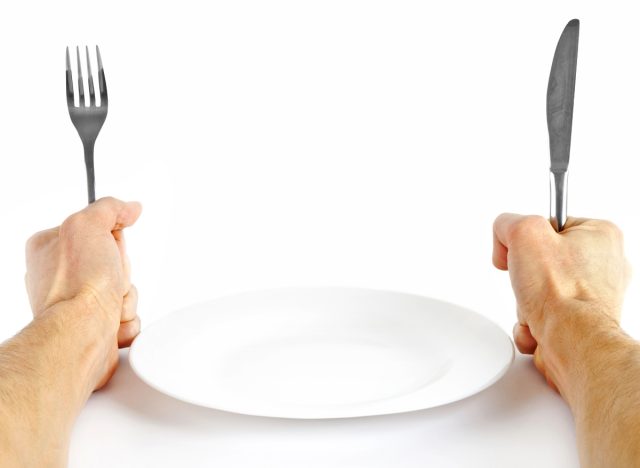
It's easy to assume that dieting means eating a lot less. But according to Melissa Mitri, MS, RD, nutrition writer and owner of Melissa Mitri Nutrition, you could actually be making the mistake of not eating enough. Mitri explains, "Eating too little throughout the day can have the opposite effect on your metabolism, causing you to feel more ravenous and overeat later on."
Be sure to not skip out on any meals. Instead, eat consistent, well-balanced meals, and keep snacks on hand that are chock-full of healthy fats, protein, and healthy carbs to make your body feel satisfied and make you less likely to reach for something unhealthy.
Snacking at night

After a long day, it's totally natural that you want to relax and reward yourself with a treat. But the last thing you should do is to start munching before bed. "Late-night snacking can sabotage your best weight loss efforts during the day," says Mitri, "leading to excess calories, often from less healthful foods like chips and desserts."
To avoid this bad habit, be mindful of what causes your urge to snack. For instance, are you extra stressed out or emotional? Once again, Mitri suggests, "Plan ahead by having balanced snack options on hand, such as popcorn, fruit, or veggies and hummus."
Not getting enough fiber
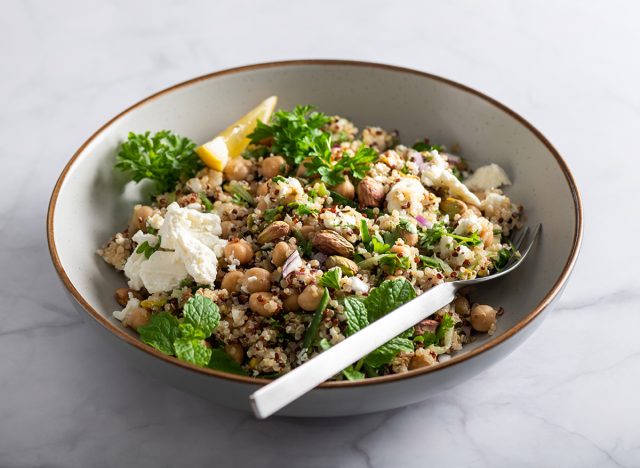
Not adding enough fiber to your diet is a big mistake that can derail your weight loss efforts. "Dietary fiber is a type of undigested carb found in plant foods that can slow your digestion and increase satiety, helping you shed weight," Mitri explains.
If you're not including enough fiber, you may always feel hungry, which can lead to unnecessary snacking and weight gain. Mitri suggests shooting for a minimum of 25 to 35 grams of high-fiber foods such as quinoa, oats, fresh fruits, veggies, and bran every day.
Not eating a well-rounded breakfast
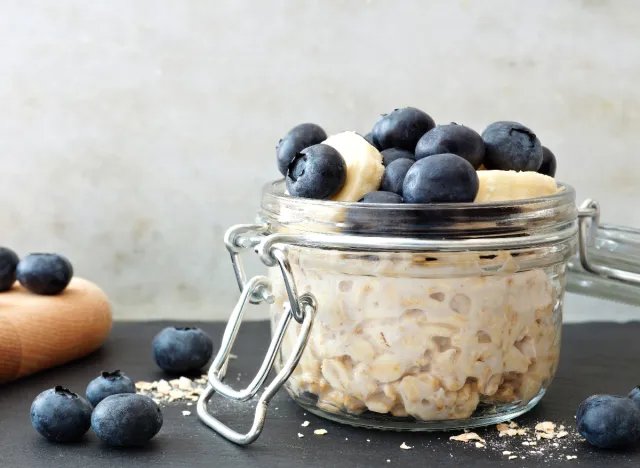
Everyone says breakfast is the most important meal of the day, and it's true! "Daily breakfast consumption is protective against weight gain because it fills you up, causing you to feel fewer hunger pangs and food cravings later on," explains Mitri. She adds, "Eating a balanced breakfast every morning helps to regulate your blood sugar levels, which can intensify hunger and related symptoms."
Some examples of a well-balanced breakfast include eggs with avocado and whole wheat toast, overnight oats with your favorite fruit, or a protein powder smoothie with leafy greens and fruit.
Drinking unnecessary calories

It's essential to be mindful of the liquid calories you are consuming. Some of the biggest offenders are juices, soda, alcohol, and surprisingly bottled smoothies. "Liquid calories don't provide much nutritional value and can start to add up quickly, contributing to unwanted weight gain," Mitri points out.
Relying on fad diets
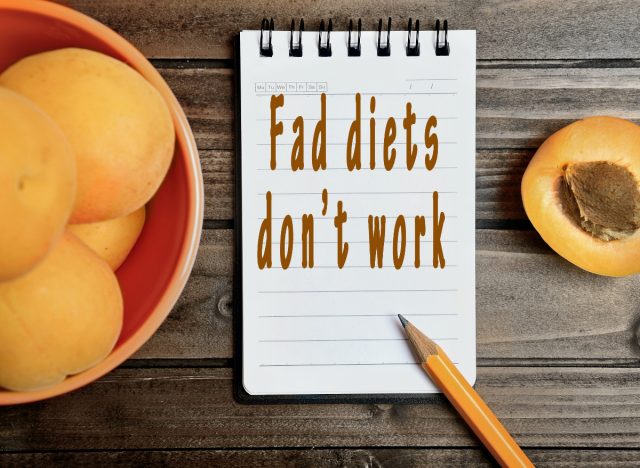
If you want to experience long-term weight loss results, avoid fad diets completely, as they can hinder your efforts long-term, according to Mitri. "Fad diets are often not personalized to you and your body and involve restrictive and unsustainable food rules," she says.
Rather than resorting to a fad diet, prioritize an all-around healthy diet that incorporates your favorite food items in moderation. You can also consider speaking with an expert such as a registered dietitian to design a personalized plan for you.
Eating too many healthy foods
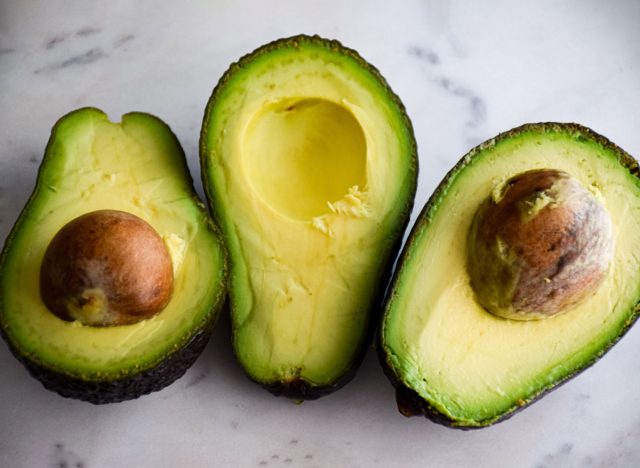
We're pretty sure you didn't see this one coming! Surprisingly, some healthy foods are best in moderate amounts, says nutritionist Lisa Young, Ph.D., RDN, author of Finally Full, Finally Slim and a member of our Medical Expert Board. Consuming too many 'healthy' fats (like those found in avocados, nuts, and olive oil), can actually crush your weight loss goals because of the excessive calories and fat you'll wind up consuming.
Young explains, "Consume such foods alongside other food groups to ensure a well-balanced diet and overall nutritious intake with a wide range of essential vitamins and minerals."
Enjoying too many smoothies

Smoothies are tasty and can be super diet-friendly—when consumed in moderation. Enjoying too many each day can negatively impact your weight loss efforts because they are filled with calories.
Young points out, "Fruits are healthy, but eating too many fruits in smoothies can cause a rise in blood sugar levels. Most smoothies also lack protein which helps stabilize blood sugar. Drink a small smoothie in moderation, and try to incorporate a balance of ingredients in your smoothies. And do not add fruit juice to your smoothie. Instead, add low-fat milk or yogurt which contains protein."
Not practicing portion control
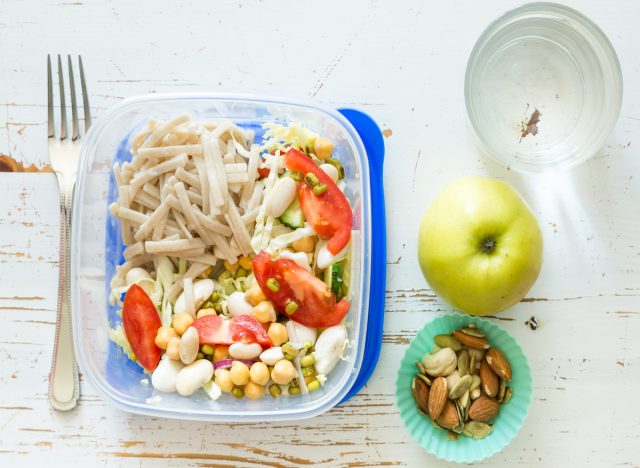
Not being mindful of your portion sizes is one of the biggest diet mistakes you can make. Portion control is an important part of any effective diet. It helps you to avoid consuming more calories than your body truly needs, which is important because losing weight requires that you burn more calories than you take in.
"To maintain weight loss progress, always be mindful of portion sizes to prevent consumption of excess calories leading to potential weight gain," Young suggests. "If you serve a larger portion size, it increases the likelihood of overeating and mindless consumption, thus try to serve appropriate portions and listen to hunger and fullness cues."









